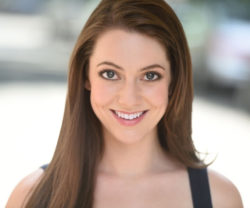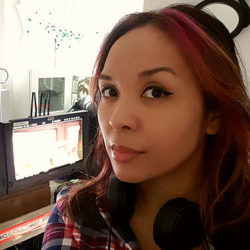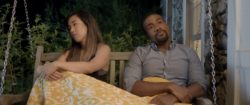CineVue got to chat with Grace Hannoy (writer, actor, and co-producer) and Zorinah Juan (director) of WHEN WE GROW UP, a feature film about a multiracial family that is brought together by the death of their family dog. Once together, they find themselves slipping back into their childhood selves and losing sight of their very real, adult circumstances. Louise (played by Grace) must decide between pursuing her dreams and keeping her family happy, Elijah worries if he will be a good father, and Maris hides a life-altering secret. Their detour through the past might be what gives them direction for the future.
We got to talk about what it was like working with an all-female cast, how we can pressure the industry to tell stories that reflect our own, and shared the joys of finding a fierce creative collaborator to throw down with you.
WHEN WE GROW UP is screening on Friday, July 27th as part of AAIFF 48. For tickets and more information, visit our Festival page.
Watch the trailer here.


Left: Grace Hannoy Right: Zorinah Juan
Grace, this was your first feature screenplay. Can you explain your process and how you decided you wanted to tackle such a story?
Grace Hannoy: The simplest truth is that I wanted to work on something I really cared about. Too often, character breakdowns, especially for women and people of color, are one-dimensional. They aren’t given a full arc or a personal emotional landscape. I gave myself permission to create characters with substance and to write a story that I wanted to see on screen.
The details of this story in particular came to me in waves. I knew I wanted to tell a story about family and about growing and learning as an adult. I also wanted to have a diverse cast and a female crew. I’m very proud that my team and I were able to accomplish and even exceed every goal I had for this story.
Zorinah, what initially drew you to this story?
Zorinah Juan: Before I interviewed with Grace and Simone, I read the synopsis for WHEN WE GROW UP and saw themes I often write about in my own work: cultural identity, failure, and belonging. After they hired me, Grace and I started working on the story more and I began to recognize pieces of myself in the characters and their personal struggles. Brian and Holly’s story line is about a couple dealing with growing apart throughout the years, and I saw my own relationship that I was in at the time. With Elijah, I empathized with the feeling of wondering if I would be the best example for the children I’ll have one day. With Maris, as a woman who has always moved in the direction of what she wanted, I could see myself confronting the possibility of having a child on my own if I didn’t meet the right guy yet, as I was really ready to start a family. Lastly, with Louise, I remembered what it was like to feel the self-imposed pressure of what I assumed my family wanted me to be. So, it almost felt like the timing of this story and this project entering my life couldn’t be more perfect. I directed this film during a time in my life where I started to grow in a way I wasn’t expecting I had to—which I think is exactly what all of the Barnes family members had to do in this movie. I was able to channel my own experience of having to “grow up” into these characters and this story which is a pretty special thing.
What was your favorite part of working together? What did you learn from each other?
ZJ: I really enjoyed delving into the characters a bit more with Grace during pre-production. I think what I learned from working with her is that there is such a thing as creative chemistry between a writer and a director. Prior to this film, I never directed a script written by someone else. I wanted to make sure I was able to maintain the integrity of the story she wrote but still express the film through my specific lens. Not only do I think we achieved that, but I think we also had a great time together making this movie.
GH: Zorinah was a creative love match for me on this project. From as early as the interview process, I knew she intrinsically understood my script and the intentions I had for the characters. I had so much fun working on the development of the story with her in pre-production. She helped me see these characters in new and exciting ways! Also, she was my literal saving grace during production.As a producer, writer, and actor, I was wearing many hats throughout the whole process. Zorinah made sure that when I stepped onto set, I was an actor. Writing questions, producing questions… those were reserved for after hours. Zorinah really protected my work, and I could not be more grateful for that. I’ve learned so much from her that it’s hard to quantify. Perhaps most importantly, I learned the importance of finding fierce collaborators who will care for your work, adopt it, and help you raise it as their own. My entire cast and crew were the best co-parents I could have asked for to raise this movie.

How do you think WHEN WE GROW UP tugged at the nuances of a multiracial family in America brought together by adoption? Why was it important for you to assemble this kind of cast?
ZJ: One thing that was definitely important to me as a director was not to shy away from the real feelings of being a person of color in a white family. I think that although there is an incredible amount of love, there are definitely going to be times where all of the family members will not have the same experiences or frame of reference for how their children feel operating out in the world. In early pre-production, Elijah was already written as a black character. However, Maris was not a race specific role. I’m really grateful that when Grace, Simone, and I started to talk about casting, we all agreed on casting an Asian woman. By casting the children as different races, it gave the characters and their relationships a depth that is not often seen in family dramas. Especially with the current political climate, I’m proud that we made a movie with a multiracial family brought together through adoption because we need to see more representation of these kinds of families. We need to show now, more than ever, that this is what America looks like.
Do you think of WHEN WE GROW UP as a kind of coming-of-age story for adults? If so, why the choice to do a coming-of-age story?
GH: Absolutely, it is an adult coming-of-age story! I’ve always held the belief that if you are not learning and striving for growth, then you might as well be dead. The narrative we most often see in media is of children and teenagers coming-of-age, but what happens to us after? There are so many twists and turns when it comes to growing up as an adult! Of course, the challenges of growing up as children and teenagers are important, funny, and challenging, but I might argue that the growing up that adults have to do is funnier, more tumultuous, and more heartbreaking. The experiences and feelings we have had keep growing with us. I wanted to explore that.
WHEN WE GROW UP was made with an entirely female crew. What was the inspiration behind that decision? What was working with just women like? Is this something either of you are pursuing in your future projects?
GH: The inspiration for building an entirely female team was very immediate for me and my co-producer, Simone Stadler. Women in film, especially in departments like grip & electric, are extremely underrepresented. I wanted to provide opportunities for women to work in these spaces. I wanted people to see that women are entirely capable of these roles. The reason we don’t see more women on bigger sets has nothing to do with inability and everything to do with the types of opportunities we are being denied.
ZJ: Working with an all female crew was dope. Everyone was there for the right reasons and there was a general feeling of true collaboration and very little ego. This is not to say that every man I’ve worked with had these negative traits because that’s absolutely not true. I know a lot of male collaborators who are fantastic to work with. But it was great to see so many women as department heads and who were killing it at their jobs. I love everyone who worked on this film and it’s such a great pleasure to say they were all female. In the future, I’d love to work with a well-balanced, diverse, inclusive crew where many of the department heads are women.
GH: Similarly, working with an entirely female crew was the most incredible experience I’ve ever had. Everyone came to set prepared, focused, and determined to facilitate the creation of this film. I have never seen anyone work as diligently as every member of my crew. There was kindness and playfulness, but at the same time, they approached work intensely and quickly. We didn’t have time to waste on the notion that someone had something to prove. There was a complete absence of competition. Any negativity was left outside of the work space. This is not to say that this experience could not happen with men on the crew, but I do believe that energy spoke for itself.
I am definitely committed to creating predominantly female sets that include people of color and LGBTQ folks. Until we see more balanced sets on big budget projects, I will continue to build teams that are skewed this way.
What are some things we can do to continue transforming the industry, or ways we can put pressure on the industry for a film world where the number of creators reflect the actual diversity of our stories in America?
ZJ: I think it’s pretty simple: having more underrepresented storytellers who are able to tell their stories genuinely. There are so many talented directors, writers, actors, and more who are people of color, women, LGBTQ, and are simply not given the opportunity. I say to production companies, financiers, big studios, distributors—take a risk on those stories. Change is a beautiful thing. It’s scary as fuck, but perhaps that’s exactly where the beauty of it lies—in the “what if?” or in the possibilities of what you might uncover. Change is a part of growth, and if it’s not growing, it’s dead. So, take a chance on these new stories that aren’t so new because they’ve always been around. Film and television wield so much cultural influence and power. Why not create and promote work that would advance us and elevate us collectively?
GH: I think Zorinah’s point on this is beautifully put and exactly right. To add to that, we as consumers need to put our money where our mouths are. At the end of the day, film and television are a business. We need to spend our money on the stories we want to see more of in the future! We need to be conscious consumers of media. Just like any business, big executives are not going to waste their money on a product they aren’t sure will sell. We also need to encourage diverse artists to make more work! Keep telling valuable stories that show experiences of women, LGBTQ folks, and people of color. We need these voices. It is so valuable not only to see oneself represented, but to learn about experiences outside of our own as well. Film and television have the unique task and opportunity to teach. And as we’ve both said, if we aren’t learning, we’re dying.
This is a bit of an oddball question, but in WHEN WE GROW UP, the family is brought together by the death of a dog. Do either of you have dogs?
ZJ: I had two dogs growing up and loved them! Hurt like hell when they both passed. Now I have two cats!
GH: My family has a dog, and we had one before her as well, so I’ve always grown up around them. I desperately want a puppy now, but it just wouldn’t be fair to the dog or to me at this point in my life. Losing a pet can be genuinely and staggeringly heartbreaking, even sometimes to comical effect.
